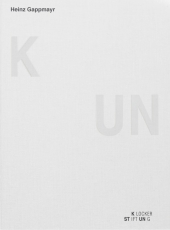 Neuerscheinungen 2015Stand: 2020-02-01 |
Schnellsuche
ISBN/Stichwort/Autor
|
Herderstraße 10
10625 Berlin
Tel.: 030 315 714 16
Fax 030 315 714 14
info@buchspektrum.de |

Heinz Gappmayr, Anton Klocker, Michael Rottmann
(Beteiligte)
Heinz Gappmayr
Aporetische Zonen. Über das Verhältnis von Schrift, Zahl und Bild zur Sprache im Werk Heinz Gappmayrs. Hrsg.: Klocker Stiftung
Mitarbeit: Klocker, Anton; Vorlage: Gappmayr, Heinz; Text: Rottmann, Michael
2015. 66 S. 36 Abb. 269 mm
Verlag/Jahr: HATJE CANTZ VERLAG 2015
ISBN: 3-7757-3919-X (377573919X)
Neue ISBN: 978-3-7757-3919-1 (9783775739191)
Preis und Lieferzeit: Bitte klicken
Hommage der Klocker Stiftung an einen führenden Vertreter der Konkreten und Visuellen Poesie
Heinz Gappmayr (1925-2010) entwickelte ab den späten 1950er-Jahren ein künstlerisches Konzept, das die Sprache selbst zum Kunstgegenstand erhebt. In mehr als 5000 Papierarbeiten, Fotografien, Werken im öffentlichen Raum und Publikationen befreite Gappmayr die Sprache von ihrer Verweisfunktion auf eine äußere Wirklichkeit und konzentrierte sich stattdessen auf ihre konkrete Realität und Materialität. Gappmayr stand im regen Austausch mit der zeitgenössischen Kunstszene weltweit und war ein wichtiger Impulsgeber etwa für Museen, Galerien, Akademien und Wissenschaft. Im Zentrum des Bandes steht der Aufsatz "Aporetische Zonen" über das Verhältnis von Schrift, Zahl und Bild zur Sprache: Michael Rottmann erarbeitet darin - als Kunsthistoriker und Mathematiker mit idealen Voraussetzungen ausgestattet - ein differenziertes Porträt dieses außergewöhnlichen Künstlers. Reproduktionen bedeutender Werke Gappmayrs begleiten den Text.
Beginning in the late fifties, Heinz Gappmayr (19252010) developed an artistic concept that elevated language itself to become an art object. In more than five thousands works on paper, photographs, works in public space, and publications, Gappmayr liberated language from its function as a reference to external reality and concentrated instead on its concrete reality and materiality. The artist participated in a lively exchange with the contemporary art scene and was an important source of inspiration for museums, galleries, academies, and science. At the heart of the volume is the essay Aporetic Zones on the relation of writing, numbers, and images to language: author Michael Rottmann, ideally equipped to do so as an art historian and mathematician, compiles a differentiated portrait of this extraordinary artist.
Beginning in the late fifties, Heinz Gappmayr (1925 2010) developed an artistic concept that elevated language itself to become an art object. In more than five thousands works on paper, photographs, works in public space, and publications, Gappmayr liberated language from its function as a reference to external reality and concentrated instead on its concrete reality and materiality. The artist participated in a lively exchange with the contemporary art scene and was an important source of inspiration for museums, galleries, academies, and science. At the heart of the volume is the essay Aporetic Zones on the relation of writing, numbers, and images to language: author Michael Rottmann, ideally equipped to do so as an art historian and mathematician, compiles a differentiated portrait of this extraordinary artist. The essay is accompanied by reproductions of Gappmayr s important works.


